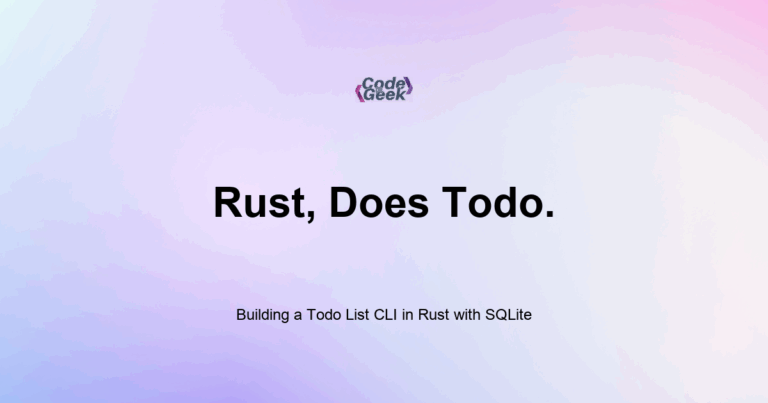New to Rust? Grab our free Rust for Beginners eBook Get it free →
CLI Argument Parsing with Clap in Rust

The clap crate lets you build powerful, user-friendly command-line interfaces in Rust. You can define commands, arguments, flags, and help messages with minimal code. It supports auto-generated help, validation, and even subcommands, all following common CLI conventions.
When I built my first Rust CLI, I manually used std::env::args, which worked for small tools but quickly became clunky. Then I found clap, and everything got easier. It handled argument parsing, validation, and help messages automatically. I could focus on logic, not argument parsing.
This article shows you how to use clap to build a clean and flexible CLI application. You will learn how to parse arguments, set defaults, handle flags, and build real user interfaces from the terminal.
Adding clap to Your Project
Add clap to your Cargo.toml file:
[dependencies]
clap = { version = "4.4", features = ["derive"] }
This enables the derive macros for easier argument parsing.
Your First CLI with clap
Start by defining a simple struct for arguments:
use clap::Parser;
#[derive(Parser)]
#[command(name = "greet")]
#[command(about = "Greet someone by name", long_about = None)]
struct Args {
/// Name of the person to greet
name: String,
}
fn main() {
let args = Args::parse();
println!("Hello, {}!", args.name);
}
This gives you:
- Automatic help (–help)
- Argument parsing
- Clear errors on invalid input
Try:
cargo run -- "Rust"
Adding Flags and Options
Use bool fields for flags:
#[derive(Parser)]
struct Args {
#[arg(short, long)]
verbose: bool,
}
Then run:
cargo run -- --verbose
Use Option<String> for optional values:
#[derive(Parser)]
struct Args {
#[arg(short, long)]
config: Option<String>,
}
Check presence with if let Some(path) = args.config.
Setting Defaults and Required Flags
You can set defaults:
#[arg(long, default_value = "output.txt")]
output: String,
You can make flags required:
#[arg(long, required = true)]
input: String,
These constraints are enforced automatically with user-friendly messages.
Handling Multiple Values
Accept multiple values with Vec<T>:
#[arg(long)]
values: Vec<i32>,
Then:
cargo run -- --values 1 2 3
You get a parsed vector of integers.
Subcommands
You can define subcommands like git add or cargo test:
use clap::{Parser, Subcommand};
#[derive(Parser)]
struct Args {
#[command(subcommand)]
command: Commands,
}
#[derive(Subcommand)]
enum Commands {
Add { name: String },
Delete { id: u32 },
}
Now run:
cargo run -- add "Alice"
cargo run -- delete --id 42
This gives you rich CLI interfaces for larger tools.
Custom Validation
You can write custom logic in main() to validate argument values.
For example:
if args.name.trim().is_empty() {
eprintln!("Name cannot be empty");
std::process::exit(1);
}
You can also use validator functions if you want stricter control.
CLI Help and Usage
Run:
cargo run -- --help
You will see:
Usage: greet <NAME>
Options:
-h, --help Print help
This is auto-generated and always kept up-to-date with your definitions.
Summary
The clap crate helps you write real CLI applications in Rust with minimal effort. With argument parsing, flags, defaults, validation, and auto help, it feels like building modern tools with zero boilerplate. Whether your CLI is small or large, clap is the right tool.
Rust Intermediate Concepts
- Generic Types in Functions and Structs
- Implementing Traits for Custom Behavior in Rust
- Trait Bounds and Constraints in Rust
- Lifetimes in Rust
- Using Closures (Anonymous Functions) in Rust
- The Iterator Trait and .next() in Rust
- Higher Order Iterator Methods: map, filter, and fold in Rust
- Using impl Trait for Simplicity in Rust
- Advanced Collections: HashSet and BTreeMap in Rust
- Custom Error Types and the Error Trait in Rust
- Option and Result Combinators in Rust
- Writing Unit Tests in Rust
- Integration Testing in Rust
- Logging in Rust with the log Crate
- Cargo Tips and Tricks for Rust Projects
- CLI Argument Parsing with Clap in Rust
- File I/O and File System Operations in Rust
- Running External Commands in Rust
- Make HTTP Requests in Rust with Reqwest
- JSON Serialization and Deserialization in Rust with Serde
- Building a Weather CLI in Rust
- Date and Time Handling in Rust with Chrono
- Using Regular Expressions in Rust with the regex Crate
- Memory Management in Rust
- Understanding Borrow Checker Errors in Rust
- Interacting with Databases in Rust
- Building a Todo List CLI in Rust with SQLite
- Concurrency in Rust




